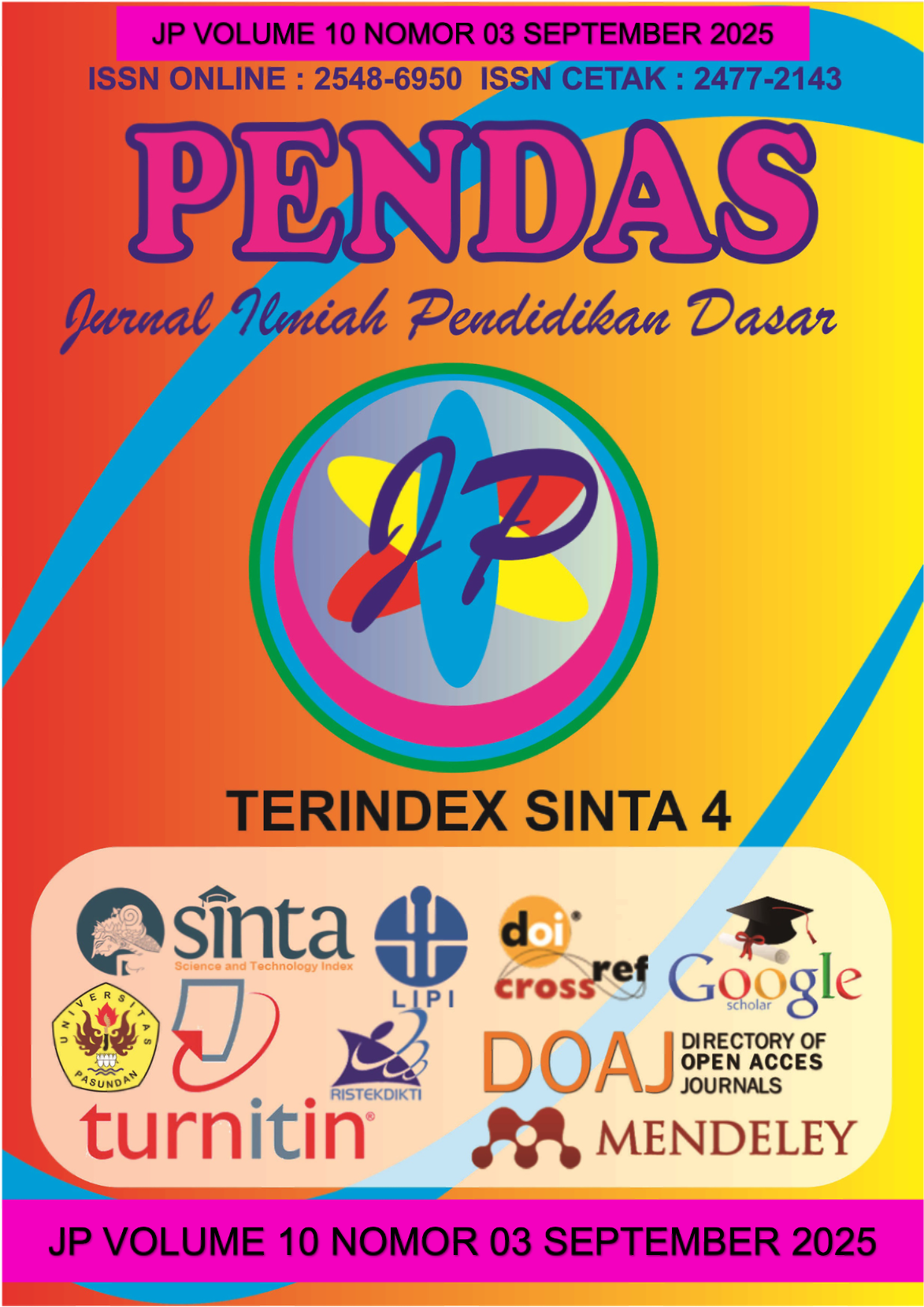EKSPLORASI ETNOMATEMATIKA PADA TRADISI MENGONJI BERAYAK DI DESA PULAU KOMANG, SENTAJO RAYA, KABUPATEN KUANTAN SINGINGI
DOI:
https://doi.org/10.23969/jp.v10i03.28578Keywords:
Ethnomathematics, Konji Berayak Tradition, Mutual Cooperation, MathematicAbstract
Culture and education are closely interconnected in shaping students' character and thinking abilities. Culturally-based learning helps link lesson content with the values, habits, and practices embedded in society, making the learning process more contextual, meaningful, relevant, and easier to understand. Mathematics, as an essential subject for developing logical thinking skills, is often considered difficult due to its abstract nature. Therefore, the ethnomathematics approach serves as an alternative solution by integrating cultural elements into mathematics learning, making it more accessible while also preserving local cultural values. This study aims to explore the application of ethnomathematics in the Mengonji Berayak tradition in Pulau Komang Village, Sentajo Raya District, Kuantan Singingi Regency. The method used is a qualitative-exploratory approach with an ethnographic design. Data collection was conducted through observation, interviews, and documentation, and analyzed using the Miles and Huberman model. The results show that the Mengonji Berayak tradition contains six ethnomathematical activities: counting, locating, measuring, designing, playing, and explaining. Mathematical concepts such as measurement, arithmetic operations, and geometry were also identified, which can be utilized as contextual and culturally-based learning resources. These findings indicate that ethnomathematical concepts are present in the Mengonji Berayak tradition and can be integrated into mathematics learning, particularly at the elementary school level in Phase B.
Downloads
References
Fendrik, M. (2023). Buku Ajar Pengembangan Pembelajaran Matematika Sekolah Dasar (D. Permana (ed.)). Winata Ilmu.
Fendrik, M., Marsiigit, & Wangid, M. N. (2020). Analysis of riau traditional game-based ethnomathematics in developing mathematical connection skills of elementary school students. Ilogretim Online - Elementary Education Online, 19(3), 1605–1618. https://doi.org/10.17051/ilkonline.2020.734497
Mawaddah, S. (2017). Mengembangkan Kemampuan Berpikir Logis dengan Pendekatan Etnomatematika. Prosiding Seminar Pendidikan Dan Pengembangan Pendidikan Indonesia, 501–511.
Prihanta, W., Harahap, D., Agustina, F., & Pohan, H. M. (2019). Kearifan Lokal Untuk Membangun Masyarakat Berliterasi Lingkungan dan Numerasi. In H. A. In’am (Ed.), Sustainability (Switzerland) (1st ed., Vol. 11, Issue 1). Bildung Nusantara. http://scioteca.caf.com/bitstream/handle/123456789/1091/RED2017-Eng-8ene.pdf?sequence=12&isAllowed=y%0Ahttp://dx.doi.org/10.1016/j.regsciurbeco.2008.06.005%0Ahttps://www.researchgate.net/publication/305320484_Sistem_Pembetungan_Terpusat_Strategi_Melestari
Putra, Z. H., Hermita, N., Alim, J. A., Fendrik, M., Hidayat, R., Harfal, Z., Oktarisa, L., Nasri, Sahlan, Nursyam, U. R., & Fatmawilda. (2023). Development of Mathematics Learning Based on Computational Thinking for Primary School Teachers. Transformasi: Jurnal Pengabdian Masyarakat, 19(2), 261–271. https://doi.org/10.20414/transformasi.v19i2.8430
Saryono, Iriansyah, S. H., & Hardiyanto, L. (2024). Konsep Dasar Pendidikan Budaya dan Karakter Bangsa. Jurnal Citizenship Virtues, 4(1), 661–673. https://jurnal.stkipkusumanegara.ac.id/index.php/citizenshipvirtues/article/view/1959
Soebagyo, J., Andriono, R., Razfy, M., & Arjun, M. (2021). Analisis Peran Etnomatematika dalam Pembelajaran Matematika. ANARGYA: Jurnal Ilmiah Pendidikan Matematika, 4(2), 184–190. https://doi.org/10.24176/anargya.v4i2.6370
Sugiyono. (2019). Metode Penelitian Pendidikan (Kuantitatif, Kualitatif, Kombinasi, R&D dan Penelitian Pendidikan) (A. Nuryanto (ed.); 3rd ed.). Alfabeta.
Sumarto. (2019). Budaya, Pemahaman dan Penerapannya “Aspek Sistem Religi, Bahasa, Pengetahuan, Sosial, Keseninan dan Teknologi". Jurnal Literasiologi, 1(2), 144–159. https://doi.org/10.47783/literasiologi.v1i2.49
Sutriani, E., & Octaviani, R. (2019). Keabsahan data.
Suwardi, Roesli, R., Asyiri, Z., Samad, R. S., Jamil, A., Taher, A., Rahman, R. I., Bukhari, I. A., Nazaruddin, R. C., Hamidi, Alwis, & Samad, R. P. (2006). Pemutahiran Adat Kuantan Singingi. Alaf Riau.
Syakhrani, A. W., & Kamil, M. L. (2022). Budaya Dan Kebudayaan: Tinjauan Dari Berbagai Pakar, Wujud-Wujud Kebudayaan, 7 Unsur Kebudayaan Yang Bersifat Universal. Journal Sambas, 5(1), 782–791.
Widyastuti, M. (2021). Peran Kebudayaan Dalam Dunia Pendidikan The Role Of Culture in The World of Education. Jaghaddita: Jurnal Kebhinnekaan Dan Wawasan Kebangsaan, 1(1), 54–64. https://doi.org/10.30998/jagaddhita.v1i1.810
Downloads
Published
Issue
Section
License
Copyright (c) 2025 Pendas : Jurnal Ilmiah Pendidikan Dasar

This work is licensed under a Creative Commons Attribution 4.0 International License.



















